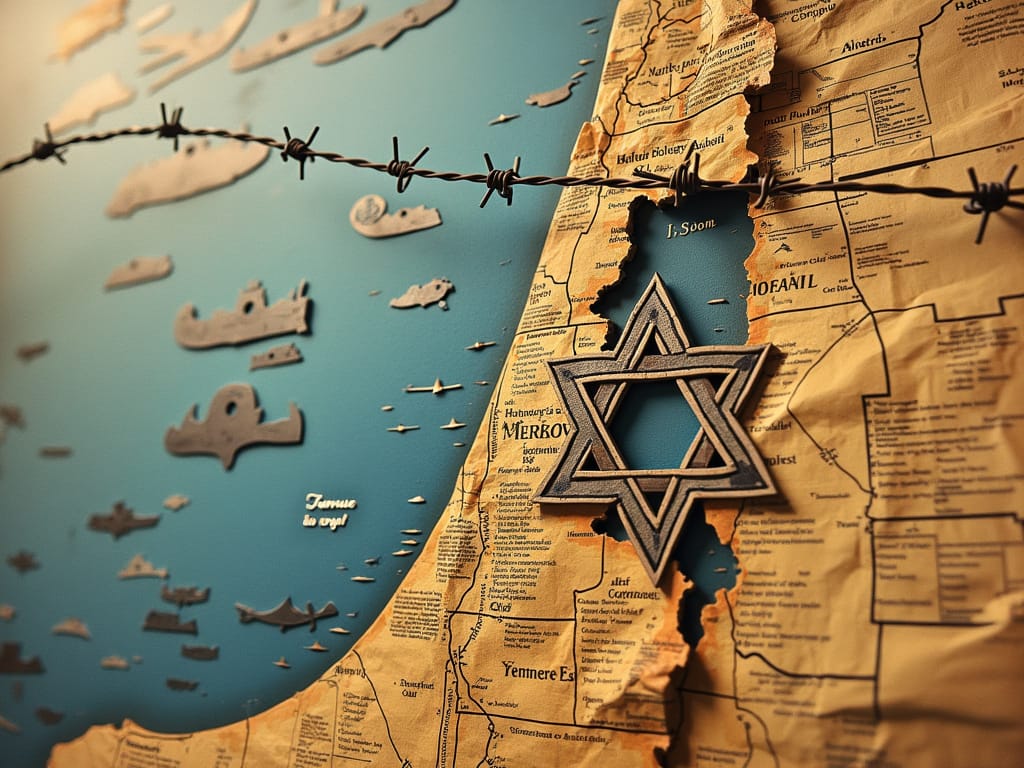

By Dr. Tim Orr
In the tapestry of human suffering, few narratives stand as stark and harrowing as that of the Holocaust. For centuries, the Jewish people endured relentless persecution, stretching from medieval pogroms in Europe to modern antisemitic violence. Yet, the Holocaust marked the brutal culmination of this historic enmity—where prejudice was mechanized into genocide. Under the Nazi regime, antisemitism took on a systematic, bureaucratic form, where millions of Jews were targeted for extermination simply because of their ethnicity. Europe, which had once been a mosaic of Jewish life and culture, was transformed into a graveyard.
Nazi ideology, based on the grotesque belief in racial purity, identified Jews as an existential threat. The Nuremberg Laws stripped them of their rights, segregating Jews from German society long before the killing began. By 1938, events like Kristallnacht (the Night of Broken Glass) showed the world the severity of Nazi intent, as synagogues burned and Jewish businesses were destroyed. The pathway to genocide was firmly established. As Hitler’s armies marched across Europe, the Jewish population was herded into ghettos and labor camps and eventually into the infamous death camps—Auschwitz, Sobibor, and Treblinka, among others—where the Final Solution was executed with terrifying efficiency.
Six million Jews were murdered, their lives stolen in the most unimaginable ways—by gas, starvation, execution, and medical experimentation. But the Holocaust was more than just physical destruction; it was an attempt to erase the very existence of Jewish identity, culture, and heritage from the world. This industrial-scale annihilation was not conducted in secret. It occurred in plain sight of a world that, for far too long, turned its back. In the face of unspeakable suffering, Europe’s democracies hesitated, and many others closed their doors to Jewish refugees fleeing the Nazi terror. The United States, Canada, and the UK, bound by restrictive immigration policies, did little to intervene. The Arab world, too, provided no haven. Leaders like Haj Amin al-Husseini, the Grand Mufti of Jerusalem, even collaborated with the Nazis, further isolating Jews from potential sources of refuge.
The Moral and Existential Imperative for a Jewish Homeland
The Holocaust revealed a fundamental truth: Jews could no longer rely on the protection of other nations. Centuries of living as a minority in Europe tolerated but never truly accepted, had culminated in the darkest chapter of their history. The Zionist movement, which had begun in the late 19th century to establish a Jewish homeland in Palestine, took on new urgency in the aftermath of the Holocaust. The establishment of Israel in 1948 was not merely a political project—it was a moral and existential necessity.
Jews, who had survived the death camps and the vast indifference of the world, needed a homeland where they could protect themselves from future genocides. The creation of Israel symbolized the right of the Jewish people to exist as a free and sovereign nation in their ancestral homeland. Yet, this act of justice and survival was met with immediate and violent resistance from Arab states, which rejected Jewish self-determination.
The Arab world, which harbored long-standing antisemitic sentiments, did not view the establishment of Israel as the return of a displaced people but as an act of aggression. Arab leaders framed the creation of Israel as the Nakba—the catastrophe. However, the term Nakba, far from being a neutral description of Palestinian displacement, is rooted in antisemitism. It embodies the refusal to accept a Jewish state and perpetuates a worldview that denies Jews the right to exist as sovereign people in their homeland (Bruckner, 2015). This narrative of catastrophe is not about borders or politics; it is about delegitimizing the very existence of the Jewish people as an indigenous nation.
The Inversion of Victimhood
In the immediate aftermath of World War II, the world—particularly the United States and the United Kingdom—expressed profound sympathy for the Jewish people. The horrors of the Holocaust had unveiled the catastrophic consequences of unchecked hatred, and for a brief moment, Jews were universally recognized as the ultimate victims of history. The creation of Israel was widely seen as a response to this unparalleled suffering, a necessary step to ensure that Jews would never again be at the mercy of the world’s indifference.
But this global sympathy was short-lived. As Israel emerged as a sovereign state, Arab nationalists and political Islamists began to invert the narrative of victimhood. In their eyes, the Jews, once the victims of genocide, had now become the oppressors. Figures such as Sir Iqbal Sacranie, the secretary general of the Muslim Council of Britain, suggested replacing Holocaust Memorial Day with a broader "Genocide Day," arguing that Muslims felt excluded and that their lives were not considered "equally valuable" to those lost in the Holocaust (Bruckner, 2015). This dangerous rhetoric marked a turning point in the discourse surrounding Jewish suffering. Sacranie’s suggestion was not about inclusivity—it was about diminishing the unique horror of the Holocaust and shifting the focus away from Jewish victimhood.
This inversion of victimhood has fueled a growing narrative in which the suffering of Palestinians, rather than the genocide of Jews, is seen as the defining tragedy of the 20th-century Middle East. The comparison of Israeli actions in the Palestinian territories to Nazi atrocities has become increasingly common, a grotesque distortion that seeks to vilify the Jewish state by equating its struggle for survival with the genocidal actions of the Nazis (Bruckner, 2015). This narrative shift is not only historically inaccurate but deeply antisemitic, as it erases the trauma of the Holocaust and reframes Jews as the perpetrators of injustice.
From European Sympathy to Global Antisemitism
The rise of Arab nationalism and political Islam in the post-war era further complicated the global perspective on Israel and Jewish victimhood. Leaders such as Stéphane Hessel, a prominent French diplomat and former resistance fighter, went so far as to claim that the Israeli occupation of Palestinian territories was worse than the German occupation of France during World War II (Bruckner, 2015). Such statements represent a shocking erasure of Jewish suffering, as they not only trivialize the Holocaust but also portray Jews as the new aggressors.
This shifting narrative has allowed Arab nationalists and Islamists to recast the Jewish people as villains. The once-persecuted Jews, whose survival in the wake of the Holocaust had garnered global sympathy, are now portrayed as colonial oppressors. At the same time, the Palestinian cause is elevated as the new moral struggle of the modern era. This narrative is not just a political critique of Israeli policies; it is a systematic effort to delegitimize the Jewish right to self-determination and erase the historical context of Jewish suffering (Bruckner, 2015).
The Persistent Necessity of a Jewish Homeland
What this inversion of victimhood obscures is the persistent necessity of a Jewish homeland. The establishment of Israel was and continues to be, a safeguard against the existential threats that Jews have faced throughout history. The Holocaust was not an isolated event but the culmination of centuries of antisemitism. The world’s failure to protect the Jewish people during World War II underscores the need for a Jewish state that can defend itself. The rise of antisemitism today, often cloaked in the language of anti-Zionism, demonstrates that this necessity has not diminished.
The Nakba narrative, which casts Israel as an illegitimate state born of catastrophe, is not merely a critique of Israeli policy—it is a denial of Jewish history and suffering. To accept the Nakba as the defining narrative of the Israeli-Palestinian conflict is to erase the moral imperative behind the establishment of Israel. The Jewish people, having survived the Holocaust, cannot afford to be subject once again to the whims of an indifferent world (Bruckner, 2015).
Conclusion: A Debt That Must Be Acknowledged
The Holocaust stands as a stark reminder of the depths of human evil and the consequences of unchecked hatred. In the wake of such an atrocity, the establishment of Israel was not only justified but morally necessary. The world owes an unpayable debt to the Jewish people, whose history is marked by centuries of persecution culminating in the genocide of six million souls. Yet today, this debt is being forgotten, replaced by a narrative that seeks to cast the Jews not as victims but as oppressors.
As global antisemitism takes on new forms, often disguised as critiques of Zionism, it is essential to remember the lessons of the Holocaust. The establishment of Israel was not a colonial imposition but a response to the failure of the world to protect the Jewish people. To deny this history is to deny the very right of Jews to exist as a free and sovereign nation. The debt the world owes to the Jewish people cannot be repaid through mere words—it is a debt that must be honored through the unwavering support of Israel’s right to exist.
References
Bruckner, P. (2015). Antisemitism and Islamophobia: The inversion of the debt. In A. H. Rosenfeld, B. Chaouat, G. Jikeli, K. L. Marcus, D. S. Patterson, E. Yakira, S. Arnold, D. S. Ben-Atar, P. Bruckner, J. A. Cahan, E. Eiglad, A. Gliszcynska-Grabias, S. Grigat, M. Küntzel, B. Kahmann, A. Tuchman, M. Weitzman, B. Harrison, & R. A. Elman (Eds.), Deciphering the new antisemitism (pp. 16-38). Indiana University Press.
Tim Orr is a scholar, Evangelical minister, conference speaker, and interfaith consultant with over 30 years of experience in cross-cultural ministry. He holds six degrees, including a master’s in Islamic studies from the Islamic College in London. Tim taught Religious Studies for 15 years at Indiana University Columbus and is now a Congregations and Polarization Project research associate at the Center for the Study of Religion and American Culture at Indiana University Indianapolis. He has spoken at universities, including Oxford University, the University of Tehran, and mosques throughout the U.K. His research focuses on American Evangelicalism, Islamic antisemitism, and Islamic feminism, and he has published widely, including articles in Islamic peer-reviewed journals and three books.
 YouTube
YouTube
Sign up for Dr. Tim Orr's Blog
Dr. Tim Orr isn't just your average academic—he's a passionate advocate for interreligious dialogue, a seasoned academic, and an ordained Evangelical minister with a unique vision.
No spam. Unsubscribe anytime.
